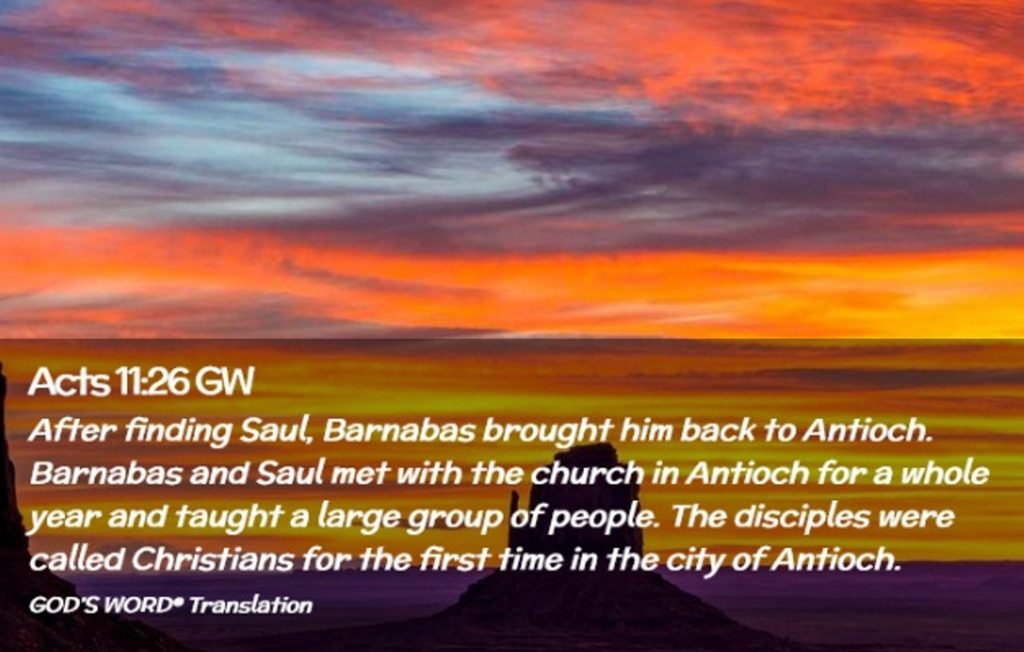“Go therefore and make disciples of all the nations…teaching them to observe all that I commanded you; and lo, I am with you always, even to the end of the age” (Matthew 28:19-20, NASB).
——————–
Contents:
1) David’s Ways of Escape (Kyle Pope)
——————–

-1-
David’s Ways of Escape
Kyle Pope
The apostle Paul told the Corinthians, “No temptation has overtaken you except such as is common to man; but God is faithful, who will not allow you to be tempted beyond what you are able, but with the temptation will also make the way of escape, that you may be able to bear it” (1 Cor. 10:13, NKJV). While this promise is given under the New Covenant, I am convinced that it describes principles that have always been true of God’s relationship to man.
First, No One Has to Sin. If all temptation is “common to man,” and yet God does not allow temptation “beyond what you are able,” it cannot be that any sin with which man struggles is unavoidable. If (as some teach) our nature is “utterly indisposed, disabled, and made opposite to all good, and wholly inclined to all evil” (Westminster Confession of Faith, 6.4), we couldn’t help but sin! The Holy Spirit tells us, however, that we are “able to bear” temptation without sin. When Paul tells the Romans “all have sinned” (Rom. 3:23) he is not describing a condition that was unavoidable, but a condition that has resulted from the fact that all accountable souls at some point choose to sin by their own freewill.
Second, God’s Law Can Be Obeyed. Paul’s words tell us as much about God’s Law as they do about His providence. If He does not “allow us to be tempted” beyond our ability to withstand but “with the temptation” provides a way to avoid sin, we cannot argue that God’s laws are too difficult for anyone to be able to obey. As burdensome as Mosaic Law was, in speaking about it, Moses told the people through the Holy Spirit “the word is very near you, in your mouth and in your heart, THAT YOU MAY DO IT” (Deut. 30:14, emphasis mine). Paul applies this same wording to the message of the gospel in his letter to the Romans (see Rom. 10: 8). The fact that we do not always obey does not mean we cannot obey.
Third, There is Always a Way of Escape. Not only is it possible to overcome sin, and possible to obey God’s law, but the Holy Spirit promises that in God’s providence there is always a “way of escape” by which we can overcome the temptation and avoid giving-in to sin. That doesn’t mean God will miraculously intervene in our freewill. David tells us that “God tests the hearts and minds” in order to see if man will choose to obey Him (Ps. 7:9). Nor does it mean that we cannot choose a course of action that makes it harder to avoid sin. The wise man said, “There is a way that seems right to a man, but its end is the way of death” (Prov. 14:12). Rather, Paul tells us that in any temptation the path to turn away from committing sin is always accessible if we will only look for it and take it!
When it comes to sin, the problem is not that it cannot be avoided, the problem is that far too often we choose not to take the “way of escape.” David’s sin with Bathsheba is a clear example of this. Consider the opportunities he chose not to take.
First “Way of Escape.” The account of David’s sin begins with the detail that it happened “at the time when kings go out to battle” (2 Sam. 11:1a). Rather than going out with his troops “David sent Joab and his servants with him” (2 Sam. 11:1b). If David had been where he should have been, doing what he should have been doing, this sin might never have happened. Sin often catches us when we neglect responsibilities we ought to fulfill, or when we are not busy with things that should occupy our time.
Second “Way of Escape.” While idle at home, the Holy Spirit tells us “from the roof he saw a woman bathing” (2 Sam. 11:2a). I didn’t really appreciate the architectural landscape of this until I was able to go to Jerusalem. The most ancient portion of Jerusalem, known as the “City of David,” lies at the foot of the Temple Mount and stretches southward along the Kidron Valley. The area believed to be where David’s palace stood sets high above the city that spreads out below it on the steep hillside that drops to the floor of the valley. The flat roofs of ancient Israelite homes were commonly used for storage, cooking, cleaning, rest or sleep in the cool of the evening (cf. Josh. 2:6, 8; Neh. 8:16). For David to see a woman under such conditions wasn’t necessarily voyeuristic on his part or immodest on her part. Even so, he could have looked away when he saw her engaged in such a private activity. Instead, he looked enough to determine “the woman was beautiful to behold” (2 Sam. 11:2b). We cannot always avoid being exposed to temptation, but we can always choose to turn away from it.
Third “Way of Escape.” As a married man, David should have been content. Instead, he inquired who the woman was (2 Sam. 11:3a). His sin would not come from ignorance—he was told her name, her father’s name, and the fact that she was “the wife of Uriah the Hittite” (2 Sam. 11:3b). For this man after God’s “own heart” (1 Sam. 13:14) that should have been enough! The Law of Moses condemned adultery (Exod. 20:14) under punishment of death (Lev. 20:10). The king was to uphold the law (Deut. 17:14-20)—not to ignore it. When temptation begins to take hold of one’s heart it is not uncommon to hear words of warning that could help us avoid sin, if we will only listen—“Words of the wise, spoken quietly, should be heard rather than the shout of a ruler of fools” (Ecc. 9:17).
David missed three opportunities that could have allowed him to escape the temptation to sin. Instead, “Immediately he went after her, as an ox goes to the slaughter” (Prov. 7:22). The “sweet psalmist of Israel” (2 Sam. 23:1) committed adultery with another man’s wife (2 Sam. 11:4)! Once sin has been committed there is no “way of escape” that allows us to take it back, but there are ways to respond to our sin lest we “add sin to sin” (Isa. 30:1).
Fourth “Way of Escape.” David’s son would declare, “He who covers his sins will not prosper, but whoever confesses and forsakes them will have mercy” (Prov. 28:13). The remaining opportunities David had to escape further compounding his sin involved avenues he was given to confess and forsake his sin. First when he learned from Bathsheba “I am with child” (2 Sam. 11:5), he could have faced his guilt and done right by her, her husband, and the child. He did not. Guilt is a frightening thing. This man who was once brave enough to fight Goliath (1 Sam. 17:36) was afraid to face his own sin!
Fifth “Way of Escape.” David hoped he could conceal his sin by bringing Uriah, her husband, back from the war (2 Sam. 11:6-8). He assumed that Uriah would go in to his wife, and all would assume any child was Uriah’s. Instead, Uriah contentiously refused to be with his wife while “the ark and Israel and Judah are dwelling in tents” (2 Sam. 11:11). David heard this man’s noble devotion. He could have allowed this to move him to see the treachery of his own sin. He could have confessed and repented. He did not. This was a man who once had a conscience so tender that he felt guilty over cutting the corner of the robe of King Saul, who was then trying to kill him (1 Sam. 24:4-6)! Sin can sear the conscience and blind us to our own actions.
Sixth “Way of Escape.” Covering sin often forces us to bring others into our web of deception. Messengers had brought Bathsheba to David (2 Sam. 11:4)—did they know about David’s sin? Somehow Bathsheba “sent” word to David (2 Sam. 11:5)—did a servant bring this message? Did this person know about this sin? David told Joab to return Uriah to Jerusalem (2 Sam. 11:6), and servants had told David that Uriah didn’t go home to his wife (2 Sam. 11:10). Did Joab know about David’s sin? Did these servants wonder why the king was so curious about Uriah’s love life? How could David care so little about the influence he had on all these people around him? In a last desperate attempt to cover sin David actually fed Uriah and “made him drunk” (2 Sam. 11:13). Surely, he must have thought, a drunken soldier would go home to his wife. Even though he was drunk, Uriah did not. When we try to hide sin, we no longer care how many people we lead into sin in the process. David could have stopped even at this point and taken the “way of escape” to avoid further sin. He did not.
Seventh “Way of Escape.” The next morning David wrote a letter and sent it to Joab in the hand of Uriah (2 Sam. 11:14). Scripture only records one sentence of this letter (2 Sam. 11:15), but the exchange that follows probably infers that there was more to it. Uriah was carrying his own death warrant! If Joab didn’t know before this about David’s sin, it is likely that he was brought into the conspiracy to cover David’s sin with this letter. David plans the means of Uriah’s death (2 Sam. 11:15), Joab carries out the plan (2 Sam. 11:16-17), then deceitfully concocts a method to inform David about the crime under the guise of a military report (2 Sam. 11:18-24). This allowed David the opportunity to word a false message of encouragement to his commanding officer (2 Sam. 11:25). The hand cannot write without the direction of the mind. What went through David’s mind as he wrote this letter? He could have thought, concerning God “Where can I go from Your Spirit? Or where can I flee from Your presence?” (Psa. 139:7). He could have said to himself, “If I say, ‘Surely the darkness shall fall on me,’ Even the night shall be light about me; Indeed, the darkness shall not hide from You, But the night shines as the day; The darkness and the light are both alike to You” (Psa. 139:11-12). At some point in his life these words were penned by this man, but not on that morning.
By missing each of these opportunities to escape sin David fell into adultery, perjury, drunkenness, collusion, conspiracy, the incitement of others to sin, and ultimately murder. David didn’t have to sin, but he ignored each “way of escape” the Lord provided. David’s failure must teach us not to follow the same course. No matter what the temptation the Lord promises “the way of escape, that you may be able to bear it” (1 Cor. 10:13). Our task is to look for it and follow it!
— Via Faithful Sayings, Volume 25, Issue 51, December 17, 2023
——————–
The Steps That Lead to Eternal Salvation
1) Hear the gospel — for that is how faith comes (Rom. 10:17; John 20:30-31).
2) Believe in the deity of Jesus Christ, the Son of God (John 8:24; John 3:18).
3) Repent of sins. For every accountable person has sinned (Romans 3:23; Romans 3:10), which causes one to be spiritually dead (Ephesians 2:1) and separated from God (Isaiah 59:1-2; Romans 6:23). Therefore, repentance of sin is necessary (Luke 13:5; Acts 17:30). For whether the sin seems great or small, there will still be the same penalty for either (Matt. 12:36-37; 2 Cor. 5:10) — and even for a lie (Rev. 21:8).
4) Confess faith in Christ (Rom. 10:9-10; Acts 8:36-38).
5) Be baptized in water for the remission of sins (Mark 16:16; Acts 2:38; 22:16; 1 Pet. 3:21). This is the final step that puts one into Christ (Gal. 3:26-27). For from that baptism, one is then raised as a new creature (2 Cor. 5:17), having all sins forgiven and beginning a new life as a Christian (Rom. 6:3-4). For the one being baptized does so “through faith in the working of God” (Col. 2:12). In other words, believing that God will keep His word and forgive after one submits to these necessary steps. And now as a Christian, we then need to…
6) Continue in the faith by living for the Lord; for, if not, salvation can be lost (Matt. 24:13; Heb. 10:36-39; Rev. 2:10; 2 Pet. 2:20-22).
——————–
Tebeau Street
CHURCH OF CHRIST
1402 Tebeau Street, Waycross, GA 31501
Sunday: 9 a.m. Bible Classes and 10 a.m. Worship Service
Wednesday (all but the first): 7 p.m. Bible Classes
First Wednesday of the month: 7 p.m. Congregational Song Service (about 45 minutes of singing, followed by a short talk)
evangelist/editor: Tom Edwards (912) 281-9917
Tom@ThomasTEdwards.com
https://thomastedwards.com/go/all.htm (This is a link to the older version of the Gospel Observer website, but with bulletins going back to March 4, 1990.)



